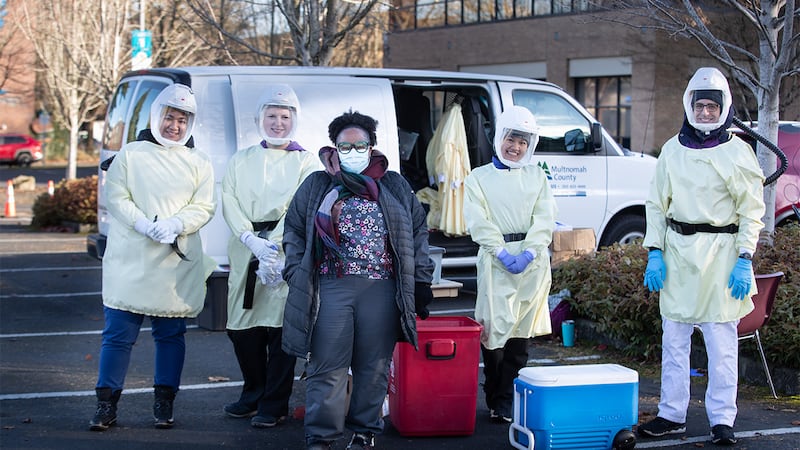A pulse oximeter measures blood oxygen levels and is one of the key ways to determine how serious someone's case of COVID-19 is.
But it's not always a racially equitable device. It can produce inaccurate results for people with darker skin tones.
And we know that thanks to an Oregonian.
THE FINDING: Michael Sjoding, a pulmonary physician and professor based in Michigan and originally from Salem, Ore., conducted a study on the device, which was published in December. His findings were first noted by the Salem Reporter.
The results, which analyzed white and Black ICU patients, revealed that compared to white patients, Black patients had hidden and dangerously low oxygen levels in their blood not detected by a pulse oximetry device at nearly three times the rate of white patients.
"The main difference with our paper is, we really focused on the situation when the pulse oximeter was reading normally," Sjoding says. "Our paper was the first one to show that in this range of oxygen levels, which seem to be normal, the pulse oximeter was potentially missing low oxygen levels more often in Black patients."
WHY IT MATTERS: Sjoding recognized the increasing significance of these tests amid the spread of the COVID-19 virus, which attacks the lungs.
But finding an alternative to the oximeter isn't easy.
The test uses a painless device that attaches to the fingertip. The alternative is an arterial blood gas test that draws blood directly from an artery, which is a more invasive and painful procedure.
"I wouldn't advocate for the arterial blood gas test. It's riskier to draw blood from an artery," Sjoding says. "The technology needs to change so there's no more bias. Conversations I've had with manufacturers is that there is a way to change the technology. That, by far, would be the best solution."
Dr. Gopal Allada, an Oregon Health & Science University associate professor and pulmonary specialist, says he's been having ongoing conversations with his colleagues and students since the study came out.
"Within a week after [the study published], I was working in the ICU and we were taking care of a brown person and we were reflecting," Allada says. "It triggers a lot of conversations within people who use the tool."
The information was disseminated to his division shortly after publication. Allada says the concept has been proven; therefore, further research in Oregon is not exactly the answer. Sjoding doesn't think so either: "I think there's no reason to think that the findings would be different."
Dr. Jill Ginsberg, director of North by Northeast, a Portland health care center dedicated to Black health, says patients should trust their at-home readings, and if oxygen levels ever drop, they should check with a health care provider regardless of their skin tone. A critical factor is having enough trust in one's doctor to ask questions, which can be a challenge in Oregon, where there's a lack of racial diversity in the medical field.
"It's a limitation of technology—if our health care system wasn't racist, we would understand that when we use this technology," Ginsberg says.
Sjoding's study came after he noticed more Black patients being admitted into hospitals than usual as the pandemic emerged.
"Now that people are aware of the issue, doctors can be aware that there may be circumstances where it's misread. I would advise doctors to keep this in mind," Sjoding says. "There's a long history of disparities in health care. This is just another example." LATISHA JENSEN.
This reporting has been funded in part by a grant from the Jackson Foundation. See more Black and White in Oregon stories here.
